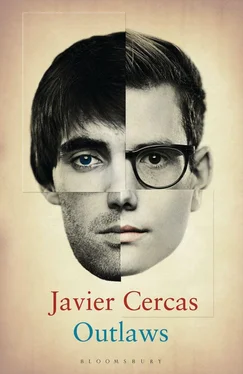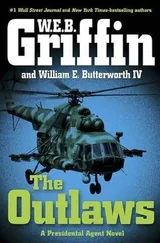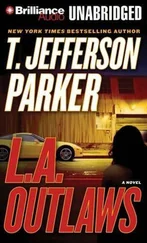‘With slight variations, conversations like this were repeated for weeks at the Royal between one beer and the next, and I participated in them with increasing anxiety as Zarco’s nervousness grew and his physical state degenerated before my very eyes (as I later discovered, in part because he’d gone back to using heroin); also as I watched unfold before my eyes, in the things that he said, the oft-repeated spectacle of the irreconcilable contradiction between his person and his persona: again he wanted the world to forget Zarco once and for all, that it let him be Antonio Gamallo, a normal man with a normal life like the majority of people; but, at the same time, once again he didn’t want to be a normal man, he didn’t want anybody to forget he was Zarco nor did he want to dispense with his pride and the privileges of being Zarco, among them that of not living the life of slavery that the majority of people lived. He didn’t want to and, in part, maybe he couldn’t: as much as he aspired to be a normal person, a new person, he panicked at the thought of not being Zarco any more, because that meant no longer being who he’d always or almost always been; likewise, as much as he aspired to live outside prison, he panicked at the thought of doing so, because it meant no longer living where he’d always or almost always lived.
‘But all this is mere speculation, or not much more. What’s certain is that at some point, perhaps tired of me arguing with him and telling him what he had to do, or simply tired of complaining, Zarco stopped coming to my office after work and I practically stopped hearing anything about him. Two or three months later — eight months after getting his third-stage parole, to be precise — the government granted him a limited pardon and conditional release. This was the premature culmination of the project we’d set in motion almost two years earlier, and, in spite of my melancholy premonition that Zarco was heading for disaster, I received the news as a triumph: not only because I’d done my work conscientiously and got Zarco out of prison in record time, or because I would be able to get the highest propaganda value out of his case this way; most of all because in those months I’d reached the conclusion that I could only get Tere back when Zarco got his freedom back and we were free of him: our relationship had always been hindered by Zarco, by our need for him as teenagers and by his need for us as adults, by the suspicions and mistakes and doubts those needs had provoked, and I imagined that, once Zarco was no longer depending on us nor us on him, Tere and I could start over again, picking up our relationship where Tere had left it in suspension a few months back, after the night we’d rescued Zarco from La Creueta. So I waited impatiently for news of the pardon and, as soon as I got it, I rushed to phone Zarco to tell him.
‘It was a late morning in early June or mid-June. I phoned his workplace in Vidreres and asked for him, but they told me he’d been off sick for a couple of days and hadn’t left the prison. I phoned the prison and again asked for him, but they told me he was in Vidreres. The misunderstanding didn’t surprise me. For some time the businessman who’d hired him had kept me informed of Zarco’s absences from work; this, combined with his constant lack of punctuality and refusal to submit to drugs tests, had led to the prison superintendent drafting a report advising against Zarco’s pardon and recommending rescinding his third-stage parole status with the argument that he was not ready for release. Luckily, no one had paid the report any attention, and that morning I wondered whether or not I should call the superintendent. Then I wondered whether or not to call María. I hadn’t talked to her for months, but I knew from Tere that she was fed up with her sham marriage and barely saw Zarco, which was not preventing her from turning into an increasingly popular public persona, although in her appearances on the radio, in the press and on television she talked less and less about Zarco and more and more about herself.
‘In the end I just phoned Tere. After phoning the factory in Cassà and being told she was no longer employed there, I found her at home. As I told you before, Tere and I talked on the phone every once in a while, but it was usually she who called me rather than me calling her, so, without giving her time to be surprised by my call, I told her what they’d told me at the factory in Cassà. Why didn’t you tell me? I asked. Because you didn’t ask, she answered. Have you found a new job? I asked. No, she answered. I asked her what she was planning to do; nothing, she answered. I’ve got a few months of dole coming to me, she explained. Maybe I’ll go on holiday; or maybe I’ll stay home and study: I’ve got exams next month. Tere fell silent; now it was she who asked: Has something happened? I told her what had happened. Congratulations, Gafitas, she said. Mission accomplished. I didn’t notice any enthusiasm in her voice, and I wondered if she was really glad that all this was over. Thanks, I said, without daring to ask her; instead of that I asked: Do you know where he is? Zarco? she asked: for a while now she’d gone back to calling him that, not Antonio. Isn’t he at work? No, I answered. Not at the prison either. Then I have no idea where he is, said Tere.
‘I believed her. That night I went to look for Zarco at the prison. Shortly before nine I asked through the intercom by the entrance if he’d arrived; they told me he hadn’t and I went back to wait for him in the car. I was there for a while, and I’d already decided that Zarco wasn’t coming back and I might as well leave when I saw him get out of a clapped-out Renault parked in front of the yard. Hey, Antonio! I called him, climbing out of my car. He turned towards me and waited on the sidewalk, right beside the prison gate. At first my presence seemed to annoy him — What are you doing here, Counsellor? he asked when he recognized me — but as soon as I gave him the news his expression relaxed, he took a deep breath, opened his arms wide and said: Come here, Gafitas. He hugged me. He smelled intensely of alcohol and tobacco. Well, he said as we finished hugging; I looked in his eyes: they were red. When do I get out? I don’t know, I replied. Tomorrow they announce the news, so pretty soon, I suppose. Then I hastened to warn him: But the problem is not when you’re going to get out but what you’re going to do when you’re out. During my wait I’d loaded up with arguments, and now I reproached him for not having gone to work for the last two days and asked him what he was going to live on if he lost that job and told him I knew it had been a long time since he saw María and asked him where he was going to live if not with María. Zarco didn’t let me continue. Take it easy, man, he said, putting a hand on my shoulder. I just found out I’m a free man. Save the lectures for another day; let me enjoy it for now, eh? And don’t worry about me, for fuck’s sake, I’m a big boy. For a moment that drunken laid-back attitude irritated me. I’m not worried, I replied. I just want you to understand that this hasn’t ended and it’ll all go to hell if you don’t live a normal life from now on. With all the work we’ve put in. . I understand, Zarco interrupted me again. Fuck, how am I not going to understand? The way you go on about it. He took his hand off my shoulder and gave me a pat on the cheek; then he pointed at the building where he slept, on the other side of the prison fence, on the far side of the inadequately lit yard, and added: Well, Gafitas, it’s damn late: if I don’t get in there right now I’ll be left without a pardon. Zarco had already called through on the intercom and they’d opened the gate to the yard when I suggested: Tomorrow we could celebrate the news with a drink at the Royal. I clarified: When you get off work. I added: I bet Tere would join us too if you invited her. She’s lost her job. The news didn’t seem to make much of an impression on Zarco, and I thought maybe he already knew; or that he was so absorbed in his own stuff that he’d barely heard. Tomorrow? he asked, almost without turning back to me. Tomorrow we’ll have to hold a press conference and all that, no? Well, maybe I’ll call you and we’ll talk about it.
Читать дальше












